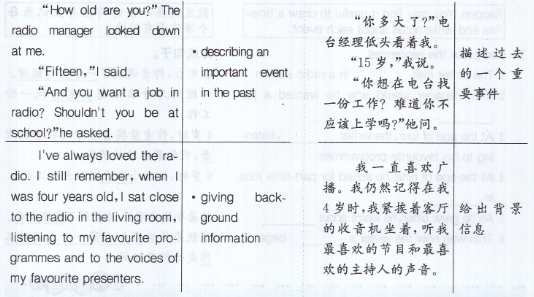Look at the photo and say what it shows.
看照片并说说它表明了什么。
a)In a book about the history of radio.
在一本关于广播的历史的书中。
b)In the life story of a tamous radio presenter.
在一个著名电台主持人的生活故
事中。
c)In a book on how radio works.
在一本关于电台如何运作的书中。
Radio times
播音时光
“How old are you?”The radio manager looked down at me.
“你多大了?”电台经理低头看着我。
“Fifteen,”I said.
“15岁,”我说。
“And you want a job in radio? Shouldn't you be at school?”he asked.
“你想在电台找一份工作?难道你不应该上学吗?”他问。
How could I explain? I've always loved the radio. I still remember, when I was four years old,I sat close to the radio in the living room,listening to my favourite programmes and to the voices of my favourite presenters. It seemed that they were speaking not to lots of listeners but to me in pweson. At the age of nine, I asked for part-time jobs in small radio stations.
我该怎么解释呢?我一直喜欢广播。我仍然记得在我4岁时,我紧挨着客厅的收音机坐着,听我最喜欢的节目和最喜欢的主持人的声音。感觉好像他们不是在和广大听众说话,而是在亲自和我说话。9岁时,我去小电台找过兼职工作。
As I grew older, my interest in radio grew. 0ne day I learnt about Internet radio. Once a week,I played my favourite music from my father's computer, talked about life at schcol, and hoped someone might be listening.
隧着年龄的增长,我对广播的兴趣与日俱增。有一天我了解了网络电台。一周一次,我用父亲的电脑播放我最喜欢的音乐,谈论学校的生活,并且希望有人能听(我的节目)。
Soon my friends at school started to listen, and then they wanted to help. We prepared a programme once a week, doing research my reading articles about music and sports news. We also did research for jokes and the weather report (I did this by looking out of the window) .
不久我学校的朋友们开始收听(这个节目),后来他们想帮忙。我们每周一次准备一期节目。通过阅读音乐文献和体育新闻进行研究。我们也研究笑话和天气预报(我通过观察窗外的情况做这个)。
6SOK,come with me,"the manager said. I sat down in the studio. He was in
another room,behind a glass wall.
“好吧,跟我来,”经理说。我坐在录音室里。他在玻璃墙后的另一个房间里。
“OK,let's do a sound check.Just tell me what you had for breakfast.”
“好,我们做一个音质测试吧。你就告诉我你早餐吃了什么。”
All radio presenters need to answer the same question before they begin work. The purpose is to check the sound level.
所有电台主持人在开始工作前都需要回答同样的问题。其目的是测试音质水平。
“I had eggs,fruit and some milk.”
“我吃了鸡蛋、水果,喝了牛奶。”
“OK,that's great!”the man behind。the glass said.
“好,很棒!”玻璃后面的男人说道。
This was how my first real job in radio loegan
这就是我在电台第一份真正的工作是如何开始的。
Learning to learn
学会学习
When you read a story,it is important to understand the order in which different events happen. You may find it useful to draw a timeline and write notes about each event.
当你读故事时,理解故事中不同事件发生的顺序是很重要的。你可能发现画一条时间轴并且记录每个事件是有用的。
1 The writer met____in a radio station.
在电台,作者遇到了一位电台经理。
2 The manager asked why he wanted a job ____.
经理问为什么他想在电台找一份工作。
3 At the age of four,the writer____,listening to his favourite programmes.
4岁时,作者紧挨着客厅的收音机坐着,听他最喜欢的节目。
4 At the age of nine,he asked for part-time jobs in____.
9岁时,他在小电台求过兼职工作。
5 As he grew older,he learnt about____.
随着年龄的增长,他了解了网络电台。
6 This was how the writer's____began.
这就是作者在电台第一份真正的工作是如何开始的。
article 文章
at the age of 在……岁时
listener 听众;听者
purpose 目的
seem好像;似乎
studio 录音室
Peter (1) to be very happy with his new job. He works in the (2) of a local radio station. He is lucky that (3) only twenty he is doing something he loves and has a real (4) . Every morning when he starts work, he does a sound check and then he looks for interesting newspaper (5) to talk about on the show. The (6) can phone in to talk to Peter or they can send emails to ask him to play their favourite songs. At the end of the show,he closes down all the equipment and goes home.
被得(1)似乎对他的新工作很满意。他在一家当地电台的(2)录音室工作。他很幸运,(3)在仅有20岁时就做自己喜欢的事情,而且有实际(4)目的。每天早上开始工作时,他做音质测试,然后在报纸上寻找有趣的(5)文章在节目中谈论。(6)听众可以打入电话与彼得谈话,或者他们可以发送电子邮件请他播放他们最喜欢的歌曲。在节目结束时,他关闭所有的设备然后回家。

Now find sentences in the passage in Activity 2 which show:
现在在活动2的文章中找到表明(这些信息的)句子:
·important events in the past 过去的重要事情
·background information 背景信息
I first appeared on TV at the age of thirteen. A television presenter stopped me in the street,and started to interview me...
我13岁时第一次出现在电视上。一位电视主持人在街上拦住我,并开始采访我……
I hope that you can join us one day.
我希望有一天你能加入到我们的行列中来。
When it's on,it means we're on air.
当它亮时,表示我们正在广播。
It seemed that they were speaking to ne in person.
好像他们在亲自和我说话。
Just tell me what you had for breakfast.
你就告诉我你早餐吃了什么。
1 The listeners tell us...
听众告诉我们……
2 They were happy lo know...
他们很高兴知道……
3 He asked...
他问……
4 Did they know...
他们知道……
5 Have you heard...
你听说……
a)...when she came into this room.
……她是什么时候进入这个房间的。
b)...what they want fo hear.
……他们想听到什么。
c)...that they won the first prize last week.
……上周他们获得了一等奖。
d)...that he will come?
……他要来吗?
e)...what he was doing at that time?
……他那时正在做什么吗?
小编推荐: 人教版八年级下册英语Unit4 SectionA 1部分课文翻译人教版八年级下册英语Unit3 SectionA 2部分课文翻译人教版八年级下册英语Unit6 SectionB 2部分课文翻译
书通网www.kj-cy.cn为广大网友提供: 优美的诗句、伤感的句子、好词好句、唯美的句子、思念的诗句、经典语句等学习生活资源。
